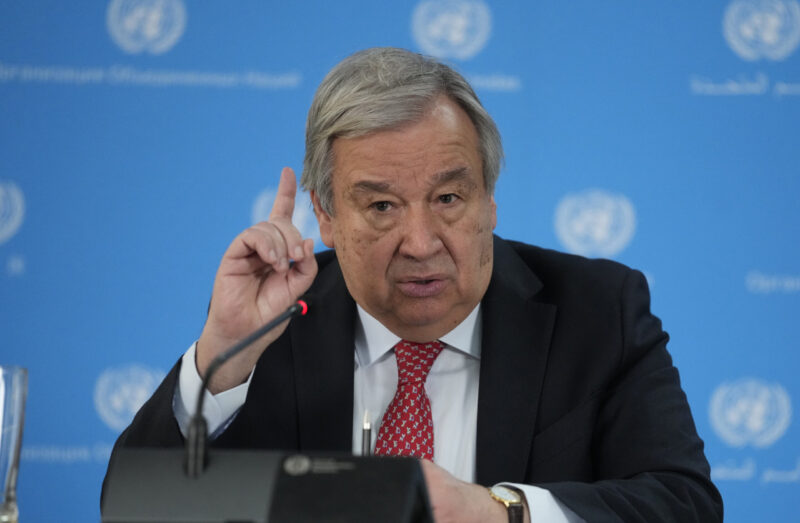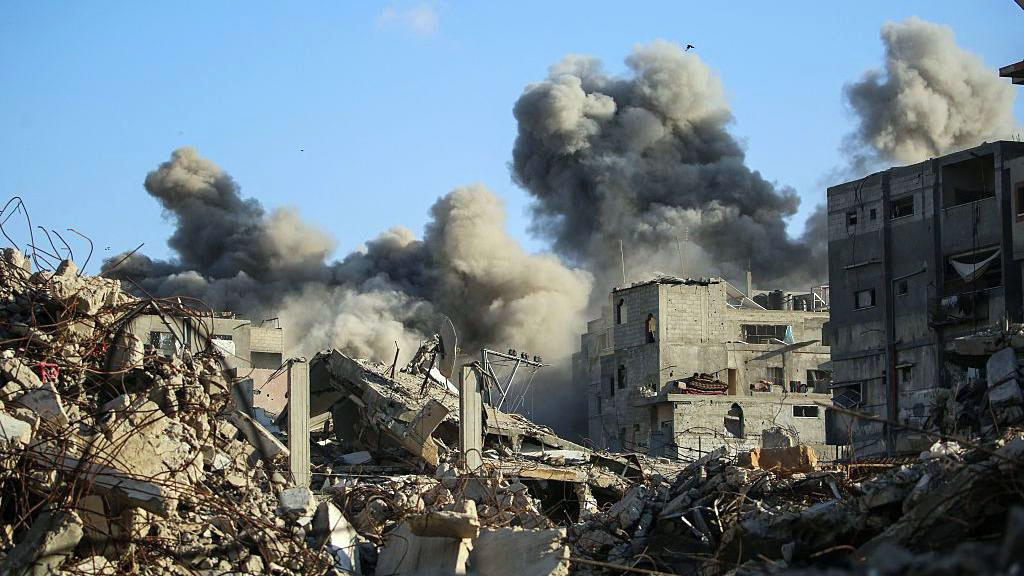International
UN warns Israel assault on Gaza’s Rafah on ‘immediate horizon’

UN warns Israel assault on Gaza’s Rafah on ‘immediate horizon’
UNITED NATIONS, April 30 (Reuters) – The United Nations on Tuesday warned that an Israeli assault on Rafah in the Gaza Strip was “on the immediate horizon” and that “incremental” progress by Israel on aid access to the enclave could not be used to prepare for or justify an operation.
U.N. Secretary-General Antonio Guterres appealed for states with influence over Israel “to do everything in their power” to prevent an Israeli assault on Rafah in southern Gaza, where more than 1.2 million displaced Gaza Palestinians are sheltering.
Israel’s Prime Minister Benjamin Netanyahu vowed on Tuesday to go ahead with a long-promised assault, whatever the response by Hamas to latest proposals for a halt to fighting in the nearly seven-month-long war and a return of Israeli hostages.
“The world has been appealing to the Israeli authorities for weeks to spare Rafah, but a ground operation there is on the immediate horizon,” said U.N. aid chief Martin Griffiths in a statement. “The simplest truth is that a ground operation in Rafah will be nothing short of a tragedy beyond words.”
Israel pledged nearly a month ago to improve aid access to the enclave of 2.3 million people after U.S. President Joe Biden demanded steps to alleviate the humanitarian crisis, saying the U.S. could place conditions on support if Israel did not act.
Guterres told reporters that there had been “incremental progress” toward averting “an entirely preventable, human-made famine” in northern Gaza, but much more was urgently needed.
READ ALSO:
- Gaza: Israeli PM Netanyahu says Rafah attack will happen despite deal
- Gaza: Israeli PM Netanyahu says Rafah attack will happen despite deal
- Georgia rocked by clashes over ‘foreign agent’ bill
“These improvements in bringing more aid into Gaza cannot be used to prepare for or justify a full-blown military assault on Rafah,” Griffiths said.
Guterres specifically called on Israel to follow through on its promise to open two crossings to the north.
“A major obstacle to distributing aid across Gaza is the lack of security for humanitarians and the people we serve. Humanitarian convoys, facilities and personnel, and the people in need must not be targets,” Guterres told reporters.
NO ALTERNATIVE TO LAND
A U.N.-backed report in March said famine was imminent and likely by May in northern Gaza, and could spread across the enclave by July. Guterres said the most vulnerable in the north “are already dying of hunger and disease.”
When asked what leverage the U.S. could use over its ally Israel to boost aid access and avert a Rafah assault, Guterres said: “It is very important to put all possible pressure in order to avoid what would be an absolutely devastating tragedy.”
U.S. Secretary of State Antony Blinken has said he will discuss with Netanyahu on Wednesday measures that Israel still needs to take to increase the flow of aid into Gaza.
“I strongly encourage the government of Israel and the Hamas leadership to reach now an agreement,” Guterres said. “Without that, I fear the war, with all its consequences both in Gaza and across the region, will worsen exponentially.”
The U.N. is in talks with the U.S. about a floating pier it is constructing to allow maritime aid deliveries to Gaza from Cyprus. Guterres said: “We welcome aid delivery by air and sea, but there is no alternative to the massive use of land routes.”
Israel’s Deputy U.N. Ambassador Jonathan Miller said last week that Israel continued “to elevate and step up” its aid support and that there had been substantial results with a “dramatic increase” in the volume of aid over the past several months.
Israel is retaliating against Hamas in Gaza over an Oct. 7 surprise attack on southern Israel led by the militant group.
Israel says about 1,200 people were killed and more than 250 people were taken hostage in the assault. Gaza health authorities say Israel has killed more than 34,000 people in its offensive in Hamas-run Gaza since then.
UN warns Israel assault on Gaza’s Rafah on ‘immediate horizon’
Reuters
International
Israeli Airstrikes Kill 12 in Gaza as Violence Persists Despite Ceasefire

Israeli Airstrikes Kill 12 in Gaza as Violence Persists Despite Ceasefire
At least 12 Palestinians have been killed in Israeli airstrikes across the Gaza Strip, the territory’s civil defence agency reported on Sunday, marking one of the deadliest days since a fragile ceasefire was implemented. The strikes hit multiple areas, including Jabalia refugee camp in northern Gaza and the southern city of Khan Younis, leaving several others injured.
The Gaza Civil Defence, responsible for rescue and emergency operations under Hamas, said one airstrike struck a tent sheltering displaced civilians in Jabalia, killing at least five people and wounding others. Another strike in Khan Younis also claimed five lives, while additional shelling in Beit Lahia and western Gaza City caused further casualties. Local authorities said most victims were civilians, including families displaced by previous attacks.
READ ALSO:
- FBI Probe Continues as Ex‑Church Minister Who Confessed to Child Abuse Remains Free
- Presidency Dismisses El-Rufai’s Thallium Claim as Diversion From N432bn Probe
- Ghana Moves to Extradite Russian Man Over Secret Sex Video Scandal
The Israel Defence Forces (IDF) said its operations targeted armed militants and underground infrastructure allegedly used to launch attacks, describing the strikes as a response to ceasefire violations. Palestinian authorities condemned the strikes as a massacre and a breach of the truce, while international observers expressed concern over the continuing civilian casualties.
Since the U.S.-brokered ceasefire in October 2023, tensions in Gaza have remained high, with sporadic clashes and violations on both sides. Gaza health authorities report that over 600 Palestinians have been killed and more than 1,600 injured by Israeli strikes since the truce took effect. Humanitarian organisations warn that repeated airstrikes have devastated infrastructure, leaving displaced families vulnerable and worsening living conditions.
International observers note that the ongoing violence threatens reconstruction efforts and regional stability. With limited access for media and aid agencies, verifying casualty figures remains difficult, though reports consistently highlight the severe impact on civilians and displaced families.
The Gaza civil defence called on residents to stay vigilant, avoid military targets, and seek safety as authorities continue to respond to emergency situations across the territory. The situation underscores the fragility of the ceasefire and the urgent need for renewed diplomatic efforts to prevent further civilian casualties.
Israeli Airstrikes Kill 12 in Gaza as Violence Persists Despite Ceasefire
International
FBI Probe Continues as Ex‑Church Minister Who Confessed to Child Abuse Remains Free

FBI Probe Continues as Ex‑Church Minister Who Confessed to Child Abuse Remains Free
An ex‑minister of a secretive Christian group who publicly admitted to child sexual abuse during a BBC interview remains free more than two years later, despite ongoing investigations by the Federal Bureau of Investigation (FBI) and renewed allegations from other victims. The man, Robert Corfield, once served as a minister in a shadowy church commonly known as The Truth or the Two by Twos — a global network of itinerant ministers with no official headquarters or widely recognised name. In early 2024, Corfield told the BBC that he had sexually abused a boy named Michael Havet for six years starting in the 1980s when Havet was 12 years old, in Saskatchewan, Canada.
Corfield’s admission was part of a larger wave of revelations about abuse in the Two by Twos community. His name was among more than 1,100 reported to a hotline set up to document cases of sexual abuse within the church. About a month after the BBC’s initial investigation, the FBI launched a probe into allegations of child sexual abuse within the group. Although Corfield spoke to FBI agents in late 2024 or early 2025, saying he “responded with the truth,” he has not been contacted by authorities since that visit and remains at liberty in the U.S. state of Montana. When asked if he fears arrest, Corfield acknowledged that “there is that possibility.”
READ ALSO:
- Presidency Dismisses El-Rufai’s Thallium Claim as Diversion From N432bn Probe
- Ghana Moves to Extradite Russian Man Over Secret Sex Video Scandal
- Residents Flee as Gunmen Launch Fresh Attack on Kwara Community
Authorities, including the Royal Canadian Mounted Police (RCMP), have also been involved. The RCMP confirmed it investigated historic sexual assaults that occurred in the 1980s and sent files to Crown prosecutors for assessment, while the Saskatchewan Ministry of Justice noted it does not comment on cases currently under investigation. A separate alleged victim, identified only as Edward, came forward in 2025 claiming he was sexually assaulted by Corfield in 1974 at age 11, well before Corfield’s abuse of Michael. Edward also described alleged grooming behaviours, adding to concerns about Corfield’s past conduct.
Corfield’s case is part of broader allegations of abuse in the Two by Twos community, which some survivors and investigators describe as insular and resistant to external scrutiny. Advocacy groups have reported hundreds of alleged historical abusers connected to the sect globally. In the United States, a former elder of the Two by Twos was sentenced to 120 years in prison for possessing child sexual abuse material, highlighting that criminal accountability is possible when prosecutions occur. Survivors and advocates have criticised the church leadership’s historical handling of abuse allegations, alleging that serious complaints were ignored or covered up. Former members say the group’s structure — with ministers often hosted in private homes and an emphasis on internal solutions — made it easier for abuse to go unreported for decades.
While investigators continue their work, Corfield’s freedom has drawn sharp criticism from survivors like Michael, who has expressed confusion and frustration at the slow pace of legal action. Advocates have urged authorities in both the United States and Canada to urgently pursue all leads, not only against individual perpetrators but also over potential institutional failures within the church. Support networks for survivors have also grown online and through advocacy organisations, offering counselling and community resources for victims of the alleged abuse. Despite these efforts, many survivors say justice remains elusive more than two years after the minister’s public confession.
FBI Probe Continues as Ex‑Church Minister Who Confessed to Child Abuse Remains Free
International
Trump Halts Minnesota Immigration Crackdown After Fatal Shootings, Protests

Trump Halts Minnesota Immigration Crackdown After Fatal Shootings, Protests
The Trump administration has officially halted Operation Metro Surge, a controversial immigration enforcement operation in Minnesota, following widespread protests, political backlash, and the deaths of two U.S. citizens. The decision was announced by Tom Homan, the U.S. “border czar,” who confirmed that President Donald Trump approved ending the monthslong crackdown.
Operation Metro Surge, launched in December 2025, focused on the Minneapolis–St. Paul metropolitan area, deploying nearly 3,000 federal immigration officers at its peak. The operation aimed to detain undocumented immigrants, which the Department of Homeland Security (DHS) described as targeting “criminal illegal aliens.” However, reports indicate that many detainees had no criminal records, including children and U.S. citizens, raising concerns about the operation’s scope and fairness.
- Army University Professor Dies in Boko Haram Captivity After Nearly One Year
- MURIC Calls Proposed US Sanctions on Nigerian Muslims ‘Lopsided’
- Supreme Court Affirms Muslim Students’ Right to Worship at Rivers State University
The crackdown drew intense public opposition after anti-ICE protesters Renée Good and Alex Pretti were fatally shot during separate incidents in Minneapolis. The shootings intensified calls for accountability and prompted local and national criticism of federal enforcement tactics.
In a statement, Homan said, “I have proposed and President Trump has concurred that this surge operation conclude.” He noted that a drawdown of federal personnel had already begun, with a smaller contingent remaining temporarily to transition operations and coordinate with local authorities.
During the operation, DHS reported over 4,000 arrests, though critics highlighted the disproportionate impact on communities and families, emphasizing the humanitarian and civil liberties concerns arising from the surge.
Minnesota officials, including Governor Tim Walz and Minneapolis Mayor Jacob Frey, welcomed the decision, calling the operation an overreach that harmed communities and strained trust between law enforcement and residents. Civil rights groups also praised the halt but urged comprehensive immigration reforms to prevent future abuses.
The end of Operation Metro Surge marks a significant development in the national debate over immigration enforcement, sanctuary policies, and federal authority, highlighting the challenge of balancing border security with human rights and community safety.
Trump Halts Minnesota Immigration Crackdown After Fatal Shootings, Protests
-

 Education2 days ago
Education2 days agoCheck Your Name: UNILORIN Releases Updated NELFUND Refund List for 2024/2025 Students
-

 News2 days ago
News2 days agoOsogbo Sons and Daughters Mark 5th Anniversary with Awards, Political Undertones
-

 metro3 days ago
metro3 days agoWoman Arrested Over Murder of Nigerian E-Hailing Driver in South Africa
-

 metro1 day ago
metro1 day agoUS Freezes Assets of Eight Nigerians Over Boko Haram, ISIL, Cybercrime Links
-

 News2 days ago
News2 days agoAfenifere Calls for Immediate Take-Off of State Police as Terror Threats Rise in Yorubaland
-

 metro3 days ago
metro3 days agoBoko Haram Terrorists Release Video of 176 Abducted Kwara Residents
-

 metro1 day ago
metro1 day agoTerror in Lagos Traffic: Cutlass Gang Unleashes Mayhem on Mile 12–Ketu Road
-

 metro2 days ago
metro2 days agoUS Military Boosts Support for Nigeria’s Fight Against Insurgency With Ammunition, Troop















